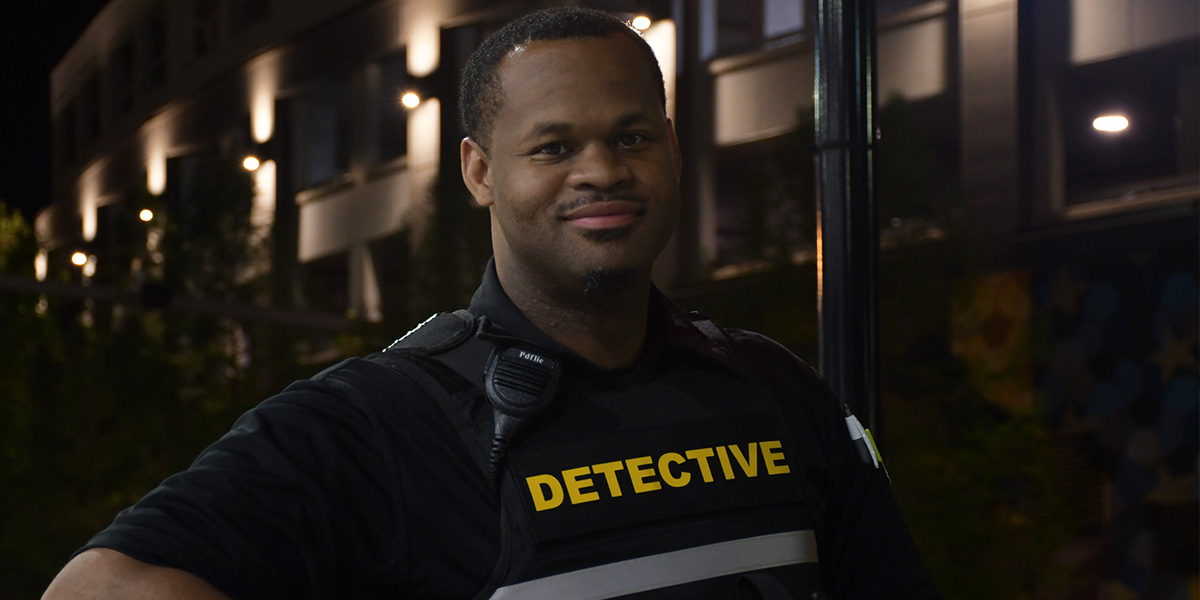
Brian Askew stands for a portrait before departing Royal Farms while on patrol. (Alisha Camacho/CNS)
By: Rachel McCrea and Alisha Camacho
Brian Askew wears a bulletproof vest, body camera, handgun, two magazine pouches, Taser, baton, flashlight, mace and two pairs of handcuffs as he goes from bench to bench in Baltimore’s Federal Hill Park, politely telling visitors the public park closes at dusk so it is time to leave.
On this hot May evening, an older couple pack up their chess set. Lovers hold hands. Friends laugh. Children play.
A roar in the distance grows louder. Young men on five motorized dirt bikes and an ATV race up the street, driving over the grass and revving their engines beneath the trees. They pull up to benches overlooking the Baltimore skyline glittering below.
Askew, with yellow “M.O.P.S. DETECTIVE” on the back of his vest, walks over. Loud but good-natured banter breaks out between Askew and the young men as he tells them the park is closed. Someone says something meant to antagonize. “Did I say anything to you, friend?” Askew asks, not taking the bait.
The tension breaks. “Y’all be safe,” he calls out as they roar off. Success.

Brian Askew stands for a portrait before departing Royal Farms while on patrol. (Alisha Camacho/CNS)
Four years ago, after a fatal shooting and late-afternoon carjacking, residents formed the Federal Hill Neighborhood Patrol and pooled resources to hire a private security firm. Askew’s firm, Matcom Office of Public Safety, took over the job two years ago.
He is a special police officer, licensed by the state to detain and arrest suspects in his jurisdiction.
Askew, 33, has spent his career in security work, eventually forming his own firm. Unlike most security guards, as a licensed special police officer, he underwent 80 hours of training to exercise the powers of a police officer, specially granted by the state.
When the historic park attracts visitors night and day over the summer, Askew clears the park up to 10 times during a night shift. Nearby acoustic devices called ShotSpotters detect and report gunshots to the police.
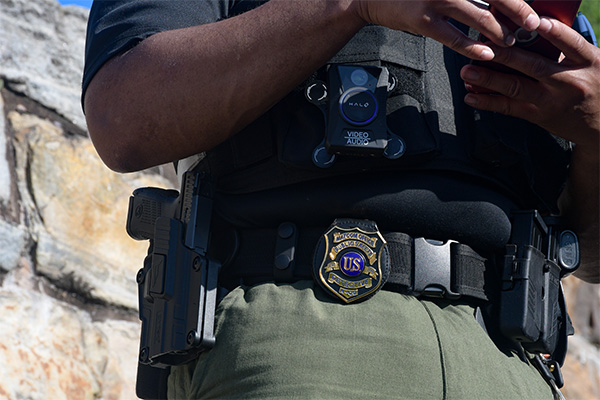
Brian Askew wears a bulletproof vest with a body camera. Visible on his duty belt is a handgun, badge, magazine holder, and Taser. (Alisha Camacho/CNS)
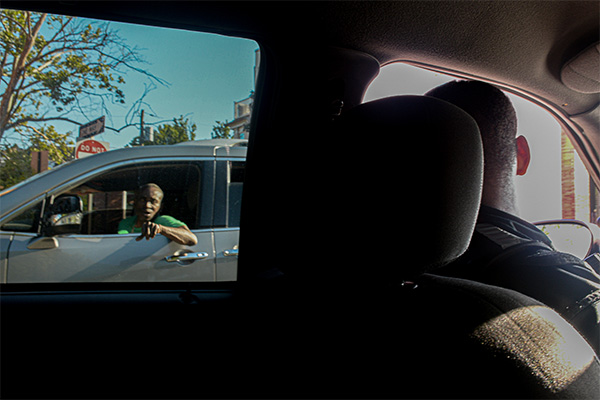
Park visitor asks Askew for directions. Residents frequently stop by the car to say hi Askew. (Alisha Camacho/CNS)
When visitors linger after dark, he taps his phone and loudspeakers blare: “Attention: please disperse immediately. Law enforcement has been contacted.” The announcement echoes from a tall surveillance unit with cameras, lights and solar panels.
Capital News Service spent two nights with Askew and his partner, Aaron Colyns, in their vehicles, patrolling Federal Hill and Little Italy and visiting the Royal Farms and 7-Eleven convenience stores on Key Highway.
Askew pokes his head into a laundromat where homeless Baltimoreans sometimes sleep and drives past an alley Colyns notes is a common spot for drug deals. Down a side street, Askew calls out to a man next to a dumpster, “Sir, that’s not a bathroom.”
Askew says he breaks up late-night street parties and fights, and responds to calls about armed people and robberies in the park. “I would be lying to you if I told you that the hair on the back of my neck doesn’t stand up sometimes.”
A CNS analysis of Baltimore police crime data shows a complicated picture. Rates of aggravated assaults and theft have decreased nearly 50% compared to the same point last year. There were no homicides, rapes or arsons in 2023 or 2024, consistent with trends since 2015 that show one or no occurrences each year. One person has been shot in Federal Hill this year.
Other crimes have surged. Burglary rates are up 225%, and robberies, including carjackings, are up 20%.
Amy Caplan Stern, vice president of the Federal Hill Neighborhood Patrol, says of private security, “It does feel safer to have him around and see his car driving by and talk to him.”
After a rocky start, Askew and his team are building a good working relationship with the Baltimore Police Department’s stretched Southern District, said Ian Neuman, the neighborhood patrol’s president.
Police agree. Baltimore Police spokesperson Amanda Krotki said Southern District Commander Jason Bennett had met recently with Neuman and Askew and the meeting “went very well.” Bennett and Askew plan to meet regularly, she said.
At first, “there was a little bit of that ‘what are you doing here?’” Neuman said, “but over time it’s turned out pretty well. Actually, I’m very satisfied with it.”
Not everyone is.
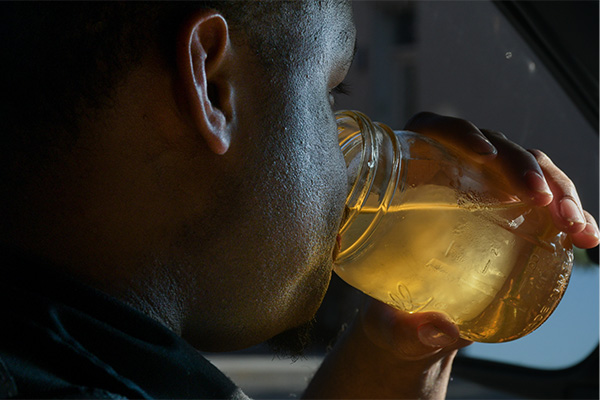
Brian Askew drinks his homemade tea-based beverage. (Alisha Camacho/CNS)
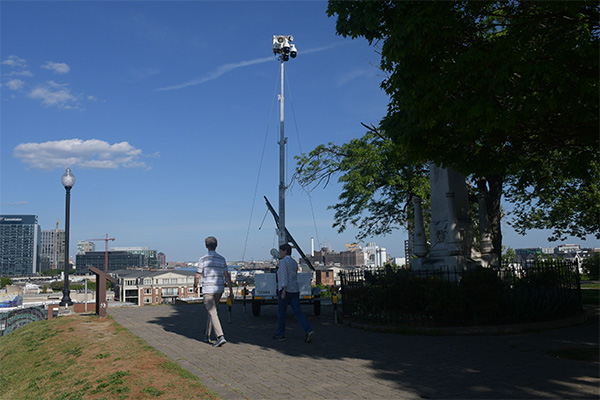
A surveillance unit from LiveView Technologies and Hayliam sits in one corner of Federal Hill Park. Askew had it installed about a week before summer patrols started. (Alisha Camacho/CNS)
As Askew asks a couple to leave the park, one woman responds defiantly that she’s lived here her whole life and it’s never been a problem to come to the park at night.
The couple leave begrudgingly. When Askew is done clearing the park and drives away, the couple start walking back toward a side entrance.
Another middle-aged woman walking her two dogs at midnight says her home was broken into two years ago and that she is dissatisfied with Matcom’s services. “I want someone who can do something,” the woman says, asking that her name not be used.
Askew talks to "Pastor" Johnnie Hodges, who had his stolen car retrieved by him, at the Royal Farms parking lot. (Alisha Camacho/CNS)
Having private security guards tell people what to do on public property is unusual and outlined in a recent memorandum of understanding with the city.
Askew drives an old police cruiser, “Big Bertha,” that he bought from a government surplus dealership. The back doors don’t open from the inside. He juggles calls from two cellphones while monitoring the rapid exchange of radio codes among his company’s dispatchers servicing 16 agencies. He can offer snacks from the trunk to defuse tension. He frequently stops to visit “Cousin Ruth” and “Big Mama Mary,” two old friends who work the night shifts at the Royal Farms and 7-Eleven.
Soon, he hopes to bring his female Belgian Malinois, the same breed of dog often used by the military and police. Askew is training Mylo, who has K-9 dog liability insurance, as an attack and explosives detection dog. “When you bring a dog out, the park clears,” Askew said.
“When you bring a dog out, the park clears,” Askew said.
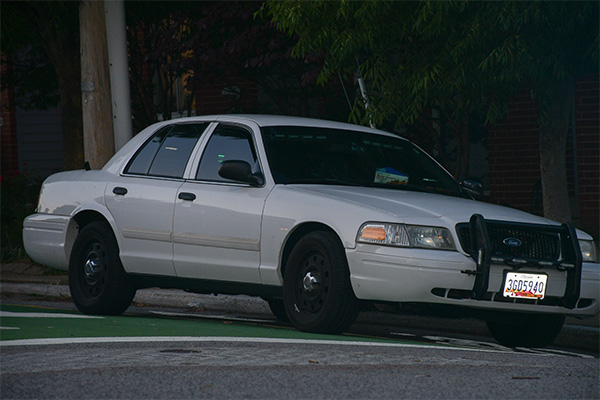
Askew’s patrol car “Big Bertha” is an old police cruiser he recently purchased from a local dealership. (Alisha Camacho/CNS)
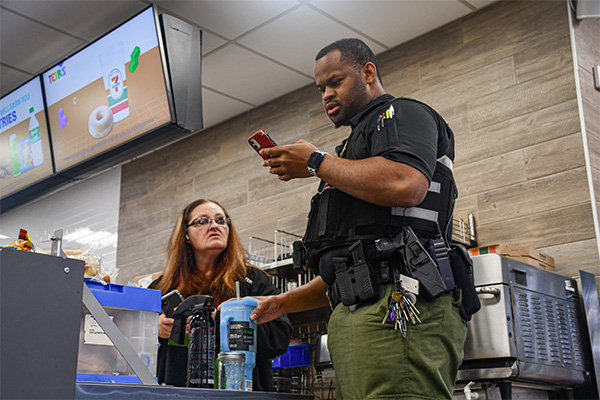
Askew talks to Mary Rowe, affectionately known as Big Mama Mary, a veteran employee of a 7-Eleven with increased retail theft. (Alisha Camacho/CNS)
Mary Rowe is standing outside the 7-Eleven when Askew arrives with homemade crab cakes and macaroni. He turns on the car’s loudspeaker. “Big Mama Mary!” he calls out, his voice distorted by the speaker.
Askew and Rowe chat about their dogs, local crime and her grandchildren. He picks out snacks and checks his phone. She’s known him for over a decade and has watched his progress.
“I’m proud of you,” Rowe says.
Rowe has worked at this store for more than 10 years. Juvenile crime, she says, has gotten worse in the last four years. Thieves, including people struggling with addiction, steal boxes of candy and phone cords to resell. Rowe started cutting the bottoms of boxes, so all the candy falls out when taken off the shelves.
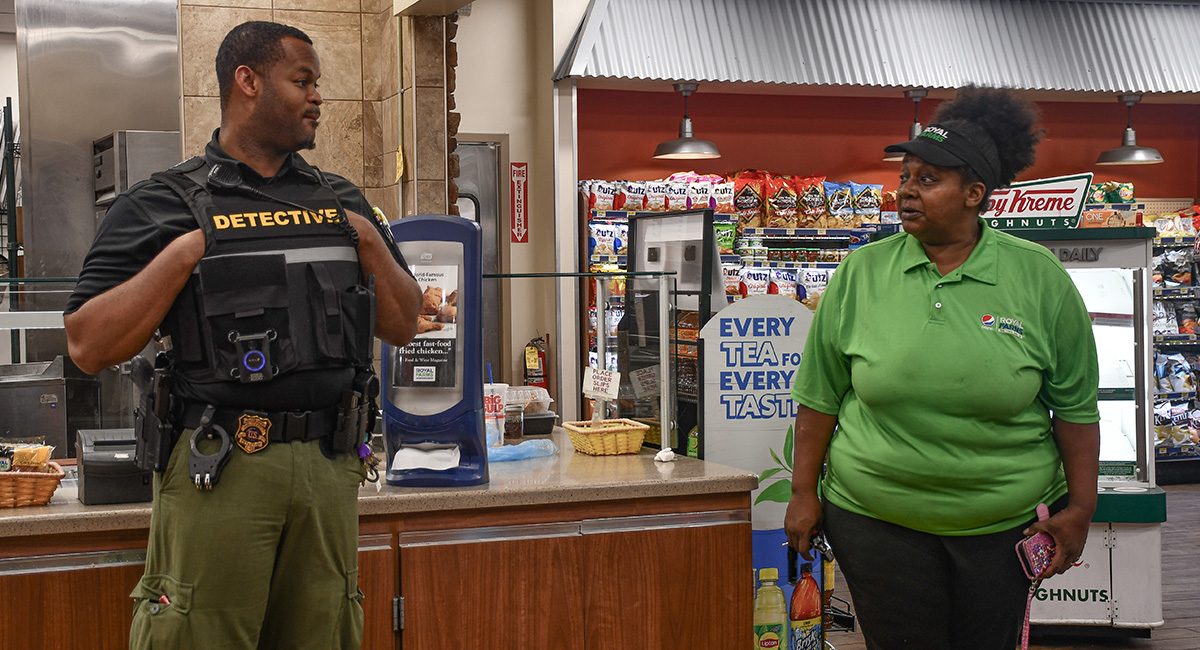
Askew talks to “Cousin Ruth,” weeks after she was punched in the face by a patron, before his patrol started for the season. Askew maintains a presence at the Royal Farms to help deter crime. (Alisha Camacho/CNS)
At about 11 p.m., Askew notices people lingering near a car on Battery Avenue. He turns off his headlights and watches the car from his open window.
He turns on the car’s flashing green and white emergency lights. “Sometimes you scare the crap out of them,” he says.
Moments after he turns on the lights, officers from the Southern District pull up behind him, inquiring about gunshots in the area.
“No, that was the um fireworks,those were just fireworks,” Askew reassures the officer. “I actually saw them.
The car Askew had been watching drives off. Concerned that the driver was under the influence, Askew has Colyns get the license plate number. Minutes later, he says he sees the car sideswipe parked vehicles across the street from Federal Hill Park.
Askew drives to a police car down the road and approaches the driver’s side window.
Askew and Colyns speak with a Baltimore Police officer after Askew saw a car hit parked vehicles late on a Saturday night. (Alisha Camacho/CNS)
“Hey, that car just hit that car down there,” he tells the officer. “We got a tag number for you.”
The officer insists on seeing the scene, and Askew leads him back to the park. Flashlights out, they inspect the scene.
“Did you observe it?” the officer asks skeptically.
“Yes sir, I did.”
“You observed it strike this vehicle.”
“That’s what I’m explaining to you, sir.”
“Okay, I just, I’m just trying to clarify.”
Askew is frustrated that the cop keeps looking at his badge, he tells Colyns later.
Free to leave the scene, the patrol continues.
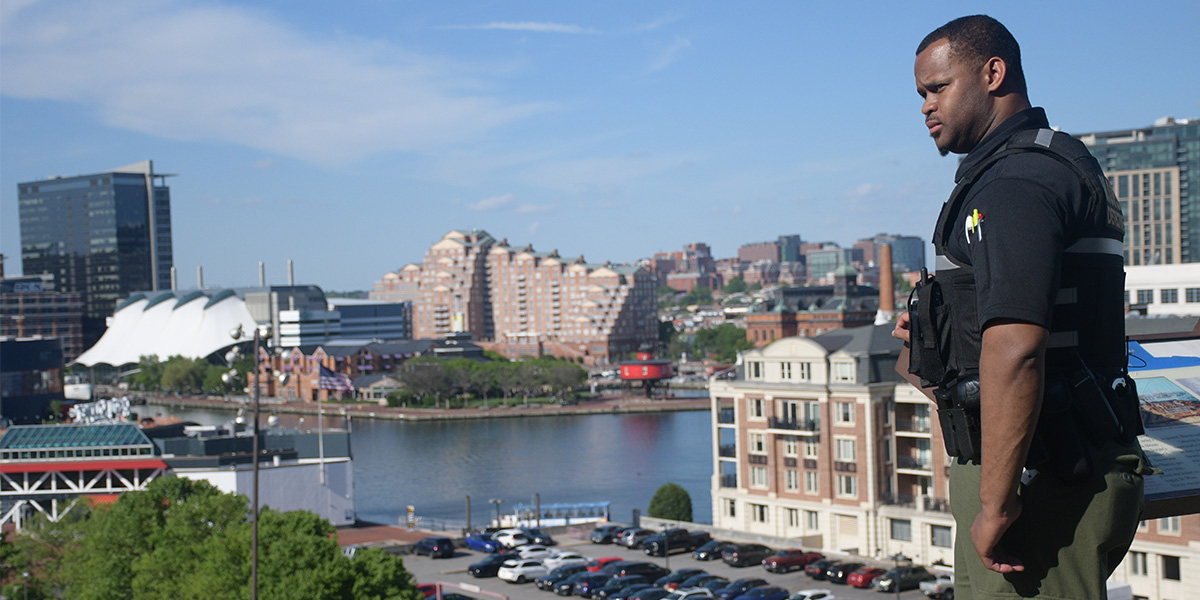
Brian Askew overlooks the Key Highway and Rash Field Park in Baltimore City. (Alisha Camacho/CNS)
Back in his car, Askew says, “Whether or not you like us or not, we’re here to help … Obviously, you don’t have the manpower.”
The Baltimore City Police Department is down at least 589 officers this year, accounting for 23% of the police force.
Askew likes to say that Baltimore will be the greatest comeback story in America. But earlier, he described it as “a crumbling city that can’t even save itself.”
Now the lights from the harbor sparkle. Sirens are a constant.
“Our city is just …,” Askew let the words hang, frustration in his voice.